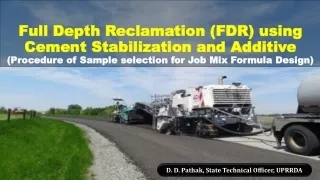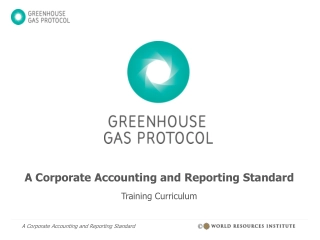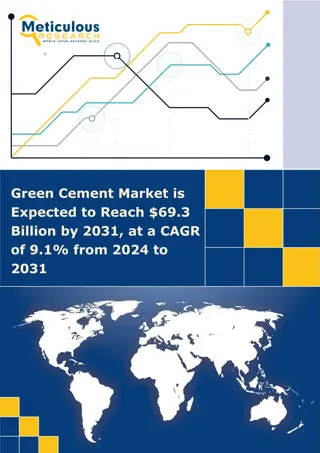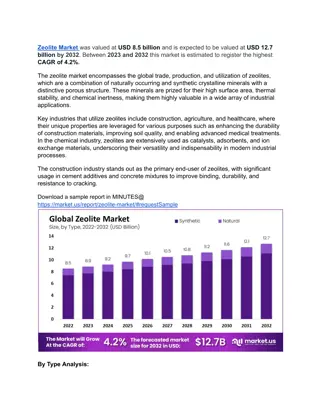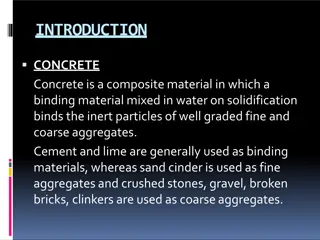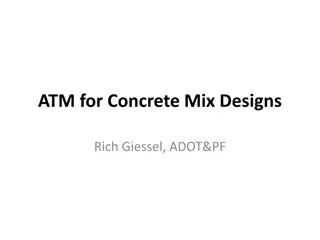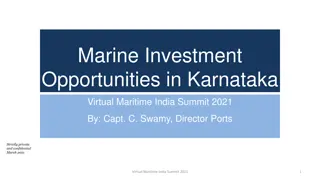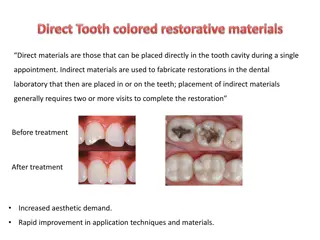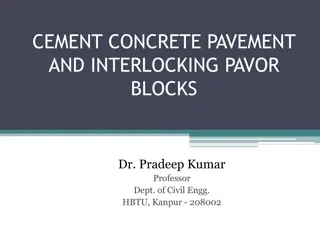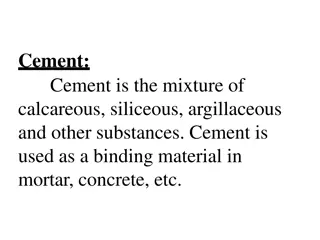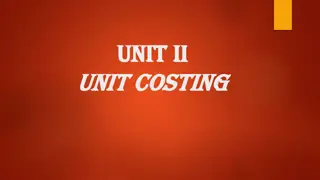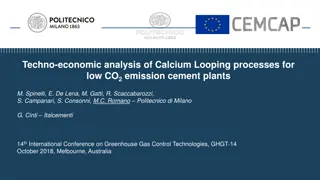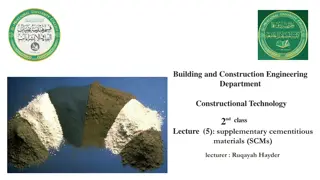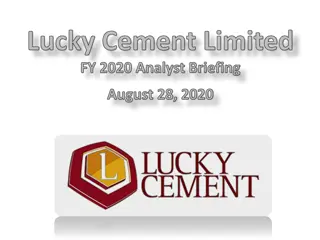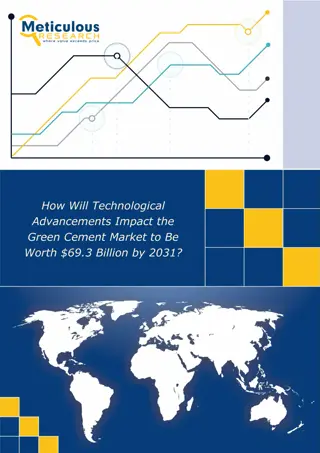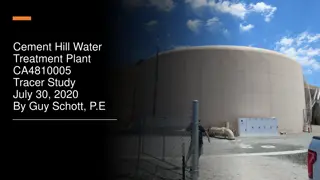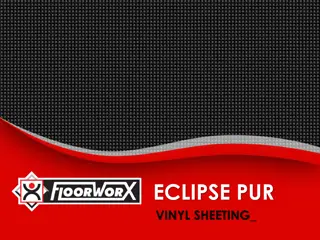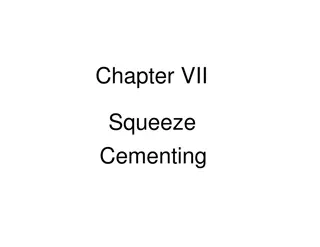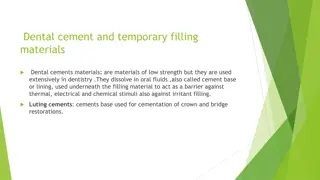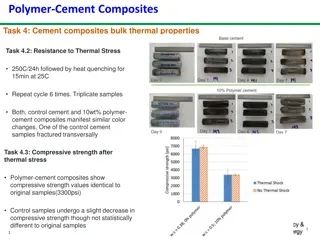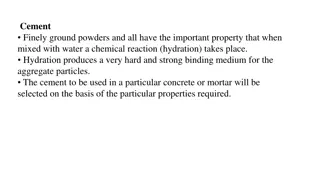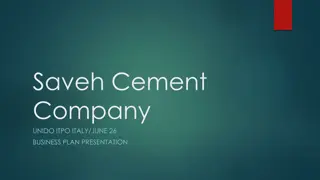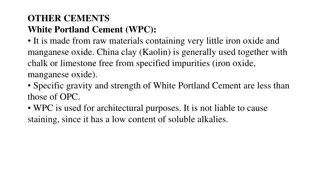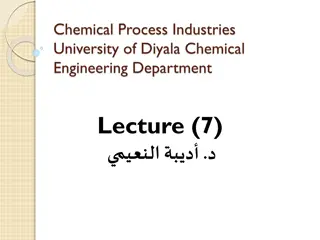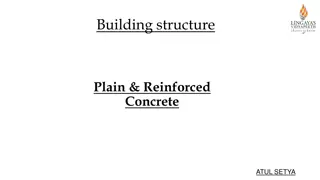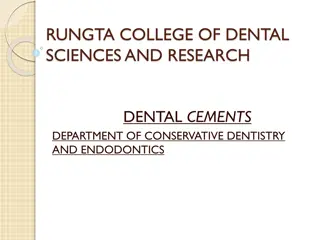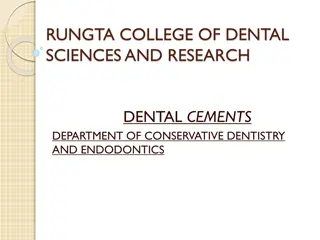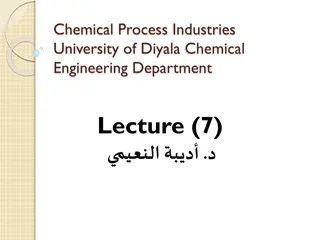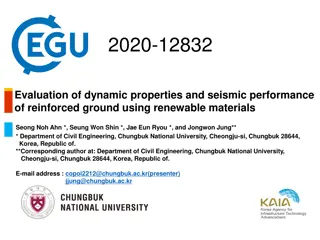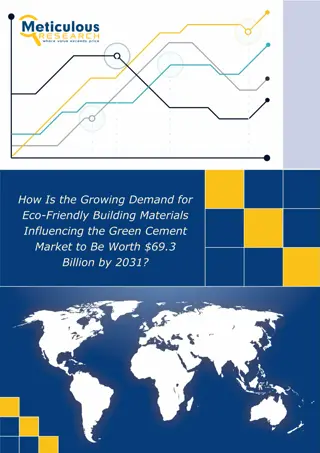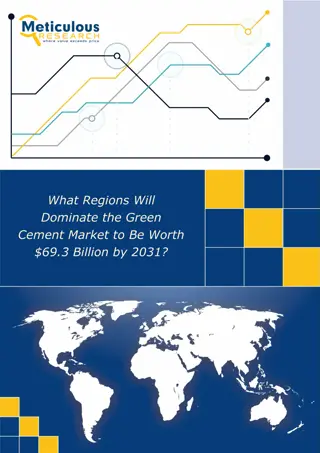Full Depth Reclamation (FDR) using Cement Stabilization and Additive
The procedure of selecting representative samples for the Job Mix Formula Design in Full Depth Reclamation (FDR) using Cement Stabilization and Additive. Understand the important principles and steps involved in sample collection.
6 views • 20 slides
A Corporate Accounting and Reporting Standard
This training curriculum covers principles of GHG accounting, organizational boundaries, setting operational boundaries, tracking emissions over time, calculating emissions, and reporting GHG emissions. It emphasizes the importance of determining which company operations and emissions sources to inc
2 views • 25 slides
Carbon Pricing Overview and EU Green Deal Agenda
The overview of carbon pricing inside the EU highlights key aspects such as the EU Green Deal, revision of the EU ETS, and the Carbon Border Adjustment Mechanism. The EU aims for carbon neutrality by 2050 with a 55% reduction target. The Fit for 55 initiative emphasizes relevance for the Energy Comm
4 views • 16 slides
Sustainable Ash Utilisation Through BTAP Wagons
The initiative focuses on achieving a minimum ash utilization percentage requirement with a target of 80% in FY 2024-25 onwards. The plan includes fine fly ash collection and transportation through BTAP wagons for sustainable utilization, aiming for an overall average of 100% ash utilization by the
0 views • 18 slides
Understanding Impression Evidence Collection in Forensic Investigations
Impression evidence plays a crucial role in forensic investigations, with examples including shoeprints, tool marks, tire tracks, bite marks, and riffling marks on bullets. The quality of impressions depends on various factors like the object making the impression, surface conditions, and the materi
1 views • 21 slides
Information on Cement and Leading Cement Companies in Indonesia
Cement plays a crucial role in binding building materials together. Learn about the definition of cement, the history of cement production, and prominent cement companies in Indonesia like Semen Indonesia, PT Cemindo Gemilang, and Holcim Indonesia.
4 views • 74 slides
Dental Materials in Conservatory Dentistry
Explore the world of dental materials used in conservatory dentistry, including Amalgam, Composite Resin, Glass Ionomer Cement, and Porcelain. Learn about their properties, applications, and benefits in restorative dental procedures. Dive into the fascinating realm of dental restoration with these v
4 views • 17 slides
Green Cement Market is Expected to Reach $69.3 Billion by 2031
Green Cement Market Size, Share, Forecast, & Trends Analysis by Material (Fly Ash, Slag, Recycled Aggregate, Other Materials), End User (Residential, Commercial, Public Infrastructure, Industrial), Geography - Global Forecast to 2031\n
0 views • 5 slides
Zeolite Market Automotive Industry Drives
Zeolite Market, By Type (Natural and Synthetic), By Application (Catalysts, Adsorbents, Detergent Builders, Cement, Animal Feed, and Other Applications), By Function, By Region and Companies - Industry Segment Outlook, Market Assessment, Competition
0 views • 3 slides
Understanding Concrete: Types, Uses, and Classification
Concrete is a composite material composed of binding materials, water, and inert particles. It is classified based on binding materials, design, and purpose. Cement concrete is widely used in construction for its strength and durability, while lime concrete offers an economical alternative where cem
1 views • 48 slides
Concrete Mix Design: Optimal Proportions & Aggregate Gradation
Concrete mix design is crucial for achieving the desired properties and performance of concrete. The Maximum Aggregate Density Mix Design method helps determine the best proportions for Portland Cement Concrete. Utilizing combined aggregate gradation near the maximum density line can reduce shrinkag
0 views • 34 slides
Key Insights on Preventive Adhesive Restoration in Dentistry
This article covers the concept of preventive adhesive restoration (PAR) in dentistry, involving techniques like visual examination, laser fluorescence, and radiographs for diagnosing caries. It discusses early interventions such as balancing oral environment, plaque cleaning, and remineralization,
1 views • 20 slides
Overview of Preventive Adhesive Restoration in Dental Care
Preventive adhesive restoration in dentistry involves using adhesive materials like preventive resin to restore teeth. Techniques for diagnosing caries include visual examination, translumination, laser fluorescence, and radiographs. Early interventions focus on balancing oral health, cleaning plaqu
3 views • 20 slides
Opportunities in Karnataka's Maritime Sector: Virtual Maritime India Summit 2021
Discover the marine investment opportunities in Karnataka highlighted at the Virtual Maritime India Summit 2021. With a well-developed industrial hinterland and picturesque coastal landscape, Karnataka offers multiple prospects in the maritime sector, including tourism development along its waterway
0 views • 10 slides
Evolution of Dental Restorative Materials: From Silicate Cement to Composite Resins
Various dental restorative materials have evolved over the years, from silicate cement to composite resins. Silicate cement, introduced in 1871, offered advantages like matching tooth color but had drawbacks such as dental pulp irritation. Unfilled acrylic polymers, developed around 1945, showed imp
2 views • 11 slides
Guidelines for Design of Cement Concrete Pavement and Interlocking Paver Blocks
This document provides guidelines for designing cement concrete pavements and interlocking paver blocks, covering factors governing design, wheel loads, design period, subgrade characteristics, approximate k values based on CBR values, and the importance of a sub-base below concrete pavements. It em
0 views • 67 slides
Overview of Cement: Types, Composition, and Functions
Cement is a vital building material consisting of various compounds like lime, silica, and alumina. It is used in mortar and concrete. The chemical composition of cement includes elements like iron oxide and gypsum. Different types of cement serve specific purposes such as rapid hardening or sulfate
0 views • 29 slides
Understanding Unit Costing in Industries
Unit costing is a method based on production units and is used in industries with continuous and uniform production of a single product or similar grades. The cost per unit is calculated by dividing the total cost incurred by the number of units produced. Various industries like collieries, quarries
2 views • 18 slides
Techno-Economic Analysis of Calcium Looping Processes for Low CO2 Emission Cement Plants
This study explores the application of Calcium Looping (CaL) processes in cement plants to reduce CO2 emissions. The process involves using CaO as a sorbent to capture CO2 from flue gas, with the potential for integration at different points in the cement production process. The Tail-end CaL configu
3 views • 14 slides
Sustainable Building Practices: Using Supplementary Cementitious Materials
Supplementary Cementitious Materials (SCMs) are waste and by-product materials that can be used as full or partial substitutes for cement in concrete production. This practice helps reduce the environmental impact of traditional cement manufacturing processes and improves the overall sustainability
0 views • 18 slides
Lucky Cement Limited FY 2020 Analyst Briefing Highlights
Lucky Cement Limited's FY 2020 Analyst Briefing highlights key figures, such as revenue growth, operating profit reduction, and sales quantity in the cement sector. Despite challenges like COVID-19, the company shows resilience with strategic investments and developments.
3 views • 13 slides
Green Cement Market
The Green Cement Market is Forecasted to Achieve $69.3 Billion by 2031, with a 9.1% CAGR between 2024 and 2031.\n
0 views • 4 slides
Tracer Study Summary at Cement Hill Water Treatment Plant
A tracer study was conducted at the Cement Hill Water Treatment Plant in CA to analyze the flow of liquid fluoride through the pipeline and storage tanks. The study involved injecting liquid fluoride into the transmission pipe post-filtration and measuring doses at different stations along the pipel
0 views • 29 slides
The Intriguing Production Process of Tennis Balls by Wilson Sporting Goods
Tennis balls are essential to the sport of tennis and are manufactured through a detailed process involving crushing, compression, sheeting, buffing, and felting. Wilson Sporting Goods, one of the major manufacturers, produces tennis balls in a factory in Thailand. The materials used in production t
0 views • 13 slides
Eclipse PUR Vinyl Sheeting - Unrivalled Colours and Co-ordination Possibilities
Eclipse PUR Vinyl Sheeting offers a vast array of colours and co-ordination options to meet evolving user needs and lifestyle trends. This durable flooring solution is easy to maintain, has enhanced life cycle cost benefits, and is 100% recyclable with 25.5% recycled content. The homogeneous vinyl f
0 views • 20 slides
Impregnation of Asbestos Cement Sheeting with Polyurethane Binder
The report discusses the successful impregnation of asbestos cement sheeting with a polyurethane binder to bond and reinforce the material. Through a method involving dye adduct formation and optimization of impregnation levels, the exposed asbestos fiber was effectively bonded. The process ensures
0 views • 6 slides
Well Cementing Procedures in Oil and Gas Industry
Learn about the important procedures involved in well cementing for remedial repair, cement squeezing at different pressures, packer operations, and water loss control using low water loss cement. Understand the steps involved in pump cementing under pressure, successful high-pressure squeezes, and
0 views • 23 slides
Understanding Dental Cements and Temporary Filling Materials
Dental cements are essential in dentistry, acting as barriers against various stimuli and irritants. They can be classified based on different compounds and have specific applications such as root canal sealers and orthodontic bonding. Zinc phosphate cement is a common material used for lining, whil
0 views • 24 slides
Study on the Thermal and Chemical Properties of Polymer-Cement Composites
The study investigates the resistance of polymer-cement composites to thermal stress and chemical attacks such as acidic and high CO2 environments. Results show similar color changes in control cement and polymer-cement composites after thermal stress, with the latter maintaining compressive strengt
0 views • 5 slides
Understanding Different Types of Cement for Construction
Cement is a crucial component in concrete and mortar, with various types available based on specific project requirements. Types include Ordinary Portland Cement for general construction, Modified Portland Cement for sulfate resistance, High Early Strength Cement for quick setting, Low Heat Portland
0 views • 5 slides
Saveh Cement Company: Business Plan Presentation Overview
Saveh Cement Company, a leading cement producer and exporter in Iran, aims to enhance energy efficiency, increase production rates, and reduce CO2 emissions through innovative projects. Established in 1988, the company boasts a strong market presence, high-quality products, and international certifi
0 views • 9 slides
Understanding Different Types of Cement
White Portland Cement (WPC) is ideal for architectural use due to its low iron and manganese oxide content, while High Alumina Cement (HAC) offers rapid hardening and sulfate resistance. Portland Pozzolan Cement provides greater sulfate attack resistance and is suitable for marine and hydraulic cons
0 views • 5 slides
Overview of Cement Industry: Processes and Classification
The lecture from the Chemical Engineering Department at the University of Diyala delves into the chemical process industries, focusing on the Cement Industry. It covers the properties of cement, raw materials required, the process of making concrete using Portland cement, and the classification of v
0 views • 10 slides
Understanding Plain & Reinforced Concrete Structures
Concrete is a vital construction material, with Plain Cement Concrete (PCC) and Reinforced Cement Concrete (RCC) being common types. PCC lacks reinforcement and is strong in compression but weak in tension. On the other hand, RCC combines concrete with steel reinforcement for improved tensile streng
0 views • 10 slides
Dental Cements in Conservative Dentistry and Endodontics
Learn about various types of dental cements used in conservative dentistry and endodontics, including zinc silicophosphate, resin cements, copper cement, and zinc oxide-eugenol cement. Understand their compositions, properties, classifications, and ideal requirements for different dental application
0 views • 18 slides
Understanding Zinc Polycarboxylate Cement in Dental Sciences
Zinc polycarboxylate cement is an adhesive luting agent used in dentistry for various applications like luting permanent restorations, bases, and liners. It consists of zinc oxide powder and a liquid solution of polyacrylic acid. This cement sets through a reaction between the powder and liquid, for
0 views • 14 slides
Evolution of Concrete in the Chemical Process Industries
Cement and concrete have a rich history dating back thousands of years. Cement was used by ancient civilizations like the Egyptians, Assyrians, Babylonians, and Romans. Concrete, which is a mixture of aggregates bonded by cement and water, revolutionized architecture during the Roman Empire. The int
0 views • 12 slides
Evaluation of Dynamic Properties and Seismic Performance of Reinforced Ground Using Renewable Materials
Improvement of seismic performance through improved dynamic properties of ground using renewable materials like cement and biopolymer is crucial for reducing earthquake-induced structural damage. This study conducted resonant column tests to assess the enhanced dynamic properties of soil and utilize
0 views • 9 slides
Green Cement Market
The global Green Cement Market is expected to hit $69.3 billion by 2031, with a CAGR of 9.1% starting in 2024. The market's growth is being propelled by advancements in sustainable construction technologies and materials.\n
0 views • 3 slides
Green Cement Market
By 2031, the Green Cement Market is projected to reach $69.3 billion, with a CAGR of 9.1% from 2024. Dive into the trends and breakthroughs driving the evolution of construction materials.\n
0 views • 3 slides
